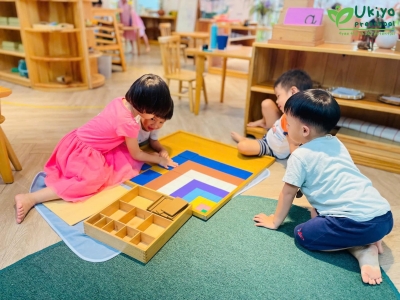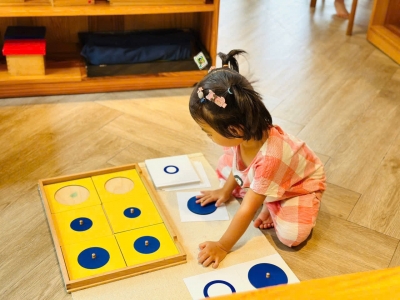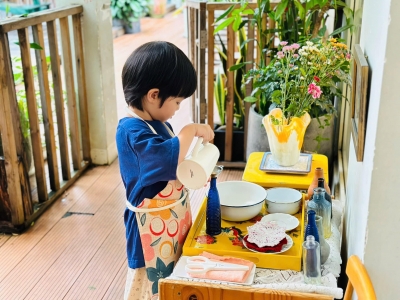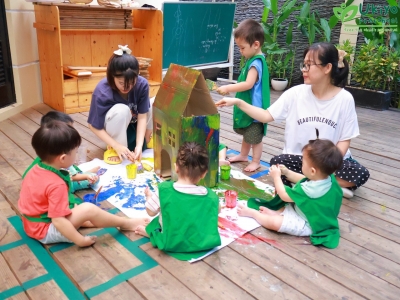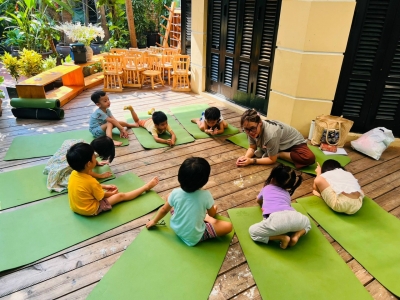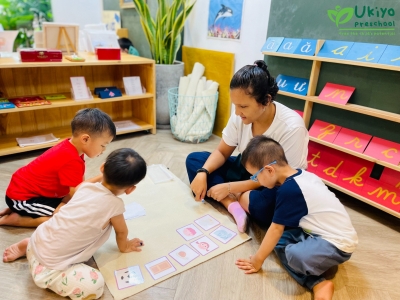HOW CLEANING AND SWEEPING PREPARE CHILDREN FOR ACADEMIC SUCCESS
More often than not the sight of children scrubbing tables, washing dishes, and cleaning floors in a classroom causes parents to raise their eyebrows. What does it have to do with a child’s development and learning math and language?
For those who implement Montessori at home and send their children to Montessori childcare or school, it is a norm to see children do everyday chores on a regular basis.
Why did Maria Montessori place such importance on practical life experiences for young children? Isn't their job to play and enjoy their childhood?
Do we force them to take on responsibilities too soon? Does it mean my child is going to be a janitor when he or she grows up? (not that there's anything wrong with being a janitor) These questions cross the mind of nearly every parent who steps into a Montessori classroom for the first time.
It turns out all the cleaning, cooking, polishing, and sweeping is far more important for a child’s development than we can imagine. Maria Montessori was nothing short of a genius. When she introduced all these activities in her classroom, she had important reasons to do so.
Not only do they prepare children for academics, but the skills they learn are also a natural progression of their development from which most children gain great inner satisfaction which eliminates the need for external rewards.
1. When children discover the outside world, they learn all the relationships between the objects - the depth, mass, volume, size, and how those concepts intertwine and work in combination. A simple process of carrying out everyday tasks like cleaning a table provides the child with the opportunity to learn about the volume of the bucket, the size of the table, and how heavy it is. All these subconscious observations lay the foundation for their future learning of math concepts. Furthermore, when sweeping the floor, the child learns spatial concepts - like “under”, “above”, “over”, and “behind” which can pose a challenge for young children.
2. Children learn to make predictions, measure, and anticipate in a familiar environment. Children are driven to those activities from within. By preparing a snack, cleaning their dishes, drying them, and preparing a tray and space for the next child, children learn to carry out a series of steps, a process that prepares them for executing abstract math problems and sequence of operations in the future.
3. Children see a purpose behind the activity. The table is clean; their tummies are full, and the floor is not slippery and safe for people to walk on. It gives them a sense of belonging, accomplishment, and service to others.
4. Children learn to gain control over their bodies and master their movements - how much pressure they need to apply on a mop, how quickly they need to move their hand when polishing shoes, and the concentration they need to possess to pour liquid from a cup.
5. There is minimal adult involvement. This means that the child gains autonomy and great satisfaction from the ability to be independent. This leads to fewer behavioral issues and a stronger connection. The child understands that the adult trusts them to perform meaningful tasks.
6. Children learn to make mistakes and know that they have total control over correcting them by cleaning up their spills and picking up rubbish.
7. Children are encouraged to persevere and give their best.
8. The concentration that children develop during practical life activities is necessary for their future ability to focus when completing mathematical work and learning to write.
As you can see, we can’t overestimate the importance of practical life activities for early childhood development at home and in the classroom. In our home children from an early age are involved in cleaning, and cooking on a regular basis every single day.
It is essential to allow them this freedom within their ability and our resources. And by resources, I mean time, patience, and boundaries that come with it.
From www.montessorinature.com
Others



